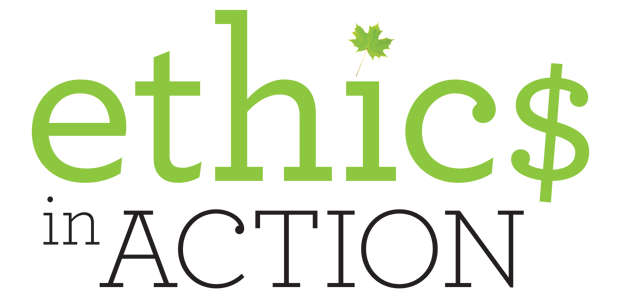Advertisement
Ethic$ in Action
Putting values into your money

Canadians feel strongly about a wide variety of social and ethical issues, from human rights and diversity in the workplace to smoking and alcohol abuse. We also rank among the most concerned citizens in the world about climate change.
Most of us express our concerns through charitable donations, fundraising events, and political activism. Now, by making ethical investments, a growing segment of Canada’s population is putting its money where its collective mouth is.
Also called sustainable or socially responsible investments, ethical mutual funds and other financial vehicles allow individual Canadians to align their beliefs with their financial goals.
Instead of focusing solely on potential profits, we can direct our money toward companies with social, ethical, environmental, and governance standards that correspond to our own values. And we can do this without jeopardizing the opportunity to increase the value of our nest egg.
Ethical investment trends
The trend toward ethical investing began more than a decade ago and continues to grow stronger year after year. By 2008 Canadians had invested more than $609 billion in socially responsible funds, an increase of 21 percent since 2006.
“Whether the goal is to promote improved environmental, social, or governance practices, or to protect the value of one’s assets, sustainable investing is moving from niche status to a broader-based acceptance,” says the Sustainable Investing Handbook, a 2007 report prepared by Guardian Ethical Management Inc.
For socially conscious Canadians, ethical investing has become not just morally attractive but also financially profitable. The Jantzi Social Index, for example, evaluates the performance of 60 Canadian companies founded on broadly based social and environmental standards. Since 2000 when the index began, it has performed at least as well as the S&P/TSX 60, which is conventionally used by investors to measure the performance of the Canadian stock market.
Mutual funds
Operated by companies such as RBC Asset Management, the Ethical Funds Company, and Investors Group, more than two dozen socially responsible mutual funds compete for the attention of Canadian investors. For example, Meritas Financial Inc. focuses exclusively on socially responsible investing through its family of seven socially responsible mutual funds.
Other socially responsible mutual fund companies in Canada, such as Growthworks, are sponsored by organized labour and invest in growing small to mid-sized businesses. This enables investors to take advantage of federal and provincial tax credits while providing an opportunity for investment returns as well.
Exchange traded funds
Investors can put their money more directly into socially responsible companies by purchasing shares of an exchange traded fund (ETF) that follows sustainable guidelines, such as the iShares Canadian Jantzi Social Index Fund.
Unlike mutual funds, which pool money from investors and charge a fee for investing it, ETFs trade on the stock exchange. Investors buy and sell them in the same way as they buy and sell shares in a company such as Bell Canada or Inco. Since it doesn’t require highly trained and highly paid professionals to administer an ETF, the fees are much lower than a mutual fund. If the ETF rises in value, investors will retain more profits.
Whether you invest in a mutual fund, an ETF, or directly in the shares of a company that meets your ethical standards, you must do your homework before you can feel completely satisfied that you’ve made the right decision.
Who is ethical?
Individual investors might question the social responsibility of Alcan, for example, or Canadian National Railways. Yet both companies qualify for the Jantzi Social Index. In some cases, companies that seem the most questionable are doing more to address problems of ethics and sustainability than more socially acceptable organizations.
Whether they’ve changed their values or not, oil companies and auto manufacturers, for example, have discovered the advantage of selling products that either alleviate climate change or, at least, fail to make it worse.
Cynics may say some companies are simply jumping on the bandwagon to blow their own horns. However, they have the money to back up their promises, and they all seem to be making progress toward producing clean vehicles and clean energy to run them.
Even cement companies, responsible for proportionately more CO2 emissions than any other industry, have jumped on the sustainability bandwagon. Generating 800 kg of carbon dioxide for every tonne of cement, the industry accounts for 5 percent of total man-made CO2 emissions.
Yet our society cannot function without concrete. Companies such as Lafarge, whose shares trade on the TSX, have taken major steps to refine their manufacturing processes, reduce waste, and curb emissions. They can continue these initiatives only if investors continue to support them.
Regardless of the way you put your values into action, you should never put all your eggs in one ethical basket. “Consider green investing a piece of your overall financial plan and diversification,” says David Bach, a financial planner and author of Go Green, Live Rich (Broadway Books, 2008). “A great place to start your research is at morningstar.com, which evaluates funds, their diversification, and their levels of risk.”
In the meantime, if the pursuit of a more ethical society allows us to sleep better at night, it feels even better to make money while we’re doing it. With an ethical investment, Canadians have a chance to do both.
|
Ethical choices The following organizations belong to the Social Investment Organization, a national association that raises public awareness of socially responsible investing. It also educates and promotes socially responsible investing in the financial community.
|




